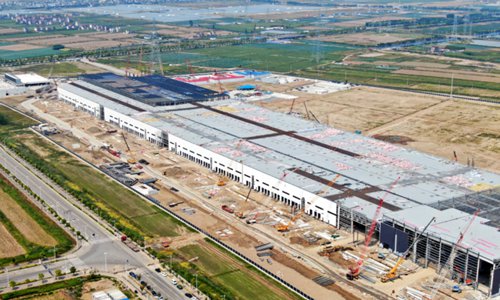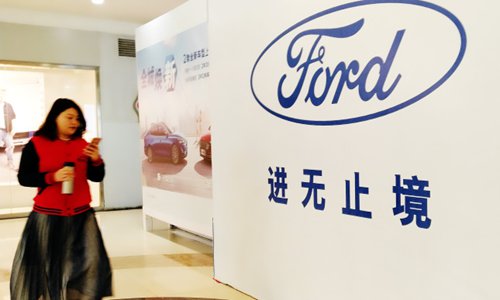Tariffs unlikely to scare foreign firms away from China
Note: The following article is taken from the Chinese-language "Commentaries on International Affairs".
Some voices in the United States have claimed that the higher tariffs on goods imported from China will drive some enterprises to move from China to elsewhere in Asia. These voices also claim that some American firms would return to the United States. These remarks fail to recognize fundamental concepts of how a market economy works.

The Tesla Gigafactory under construction in Shanghai, China on May 10, 2019. It's the American car manufacturer's first overseas plant. Photo:IC
As China moves up the global value chain, it is natural for its lower-end manufacturing sector, such as textiles, apparels, and footwear, to move out of the country. This movement is in line with the law of industrial transfers in economic development. It's a normal state of affairs for a market economy, and by no means the result of the United States imposing extra tariffs. Efforts by Washington to link these two unrelated phenomena are an attempt to scare foreign enterprises away from China by bad-mouthing its economy.
But here's the smack in the face: A recent report by the Japan External Trade Organization says China's market takes pride of place when it comes to the export, investment, and cross-border e-commerce strategies of Japanese companies. According to official statistics, the actual use of foreign capital in China was up 6.4 percent in the first four months of this year compared to the same time last year, and investment from the United States was up 24.3 percent. And the "2019 American Business in China White Paper" recently released by the American Chamber of Commerce in China has revealed that 98 percent of the American firms surveyed would continue to do business in China.
So why can't rising tariffs in the United States force American firms back home? The reason is that American investments in China are mainly in high-end manufacturing, including telecommunications equipment, computers and other electronics, and chemicals and materials manufacturing. These industries demand skilled workers, and China is the only country in the world that is home to the full range of industrial sectors. It can provide a great number of skilled workers, along with complete supply and industrial chains, which greatly reduces costs for American firms.
Take Apple as an example. It has around 800 suppliers around the world and about half of them are in China. A 2018 report by Goldman Sachs showed that if Apple moved all of its production and assembly plants back to the United States, its production costs would increase by 37 percent.
In addition to the advantages China has when it comes to production, it also has a huge domestic market. Its 1.4 billion consumers have become the most important force driving China's economic growth. The sales revenues of American firms in China stand at around 700 billion U.S. dollars, and their profits exceed 50 billion U.S. dollars. According to the white paper released by the American Chamber of Commerce in China, 69 percent of the firms surveyed indicated that their businesses in China will turn a profit even after Washington imposes punitive tariffs on goods produced in China. And if they were to leave, it remains a question whether they could find another market that can deliver them the lucrative profits they get in China.

A pedestrian walks past a billboard for Ford in Ji'nan City in Shandong Province on March 31, 2019. Photo: IC
Most important of all, over the past year or so, China's actions to further open its economy have offered a lot of reassurance to American companies. Following ExxonMobil's announcement that it would invest in a large-scale wholly-owned petrochemical project in China, and since Tesla started work on its first overseas factory in Shanghai, Ford Motor Company announced its own plan that it would start production of new Lincoln luxury vehicles in China to help it to lower costs and avoid the risk of tariffs.
Back in the United States, Washington's decision to unilaterally raise tariffs without taking into consideration the interests of the American public or American companies has greatly increased uncertainty and instability in the market. Since last year, people have seen an exodus of American firms, as they move their production chains abroad so as to better meet demand from other markets, including China. And Chicago, the third-largest city in the United States, has signed a five-year plan to boost business ties with China, aiming to enhance cooperation in fields such as health care, advanced manufacturing, innovative technology, financial services, agriculture, and food, as well as infrastructure construction.
The stick that is American tariffs won't scare away foreign firms operating in China. On the contrary, they will aggravate the hollowing out of the American domestic manufacturing sector. This outcome is the result of poor decisions made by the policy makers in Washington, who are keen to avoid their accountability by laying the blame on China.